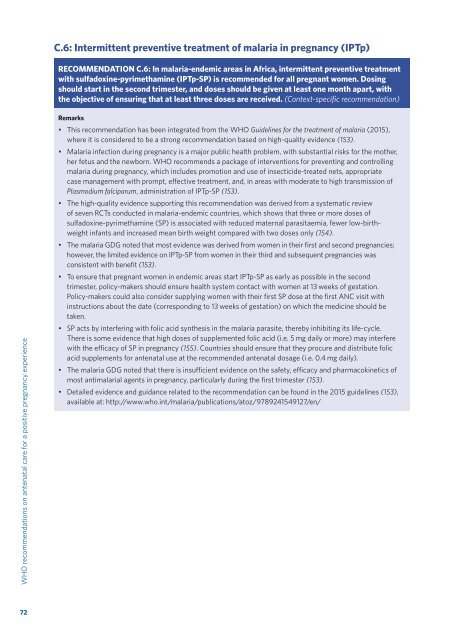WHO recommendations on antenatal care for a positive pregnancy experience
5pAUd5Zhw
5pAUd5Zhw
Create successful ePaper yourself
Turn your PDF publications into a flip-book with our unique Google optimized e-Paper software.
C.6: Intermittent preventive treatment of malaria in <strong>pregnancy</strong> (IPTp)<br />
RECOMMENDATION C.6: In malaria-endemic areas in Africa, intermittent preventive treatment<br />
with sulfadoxine-pyrimethamine (IPTp-SP) is recommended <strong>for</strong> all pregnant women. Dosing<br />
should start in the sec<strong>on</strong>d trimester, and doses should be given at least <strong>on</strong>e m<strong>on</strong>th apart, with<br />
the objective of ensuring that at least three doses are received. (C<strong>on</strong>text-specific recommendati<strong>on</strong>)<br />
<str<strong>on</strong>g>WHO</str<strong>on</strong>g> <str<strong>on</strong>g>recommendati<strong>on</strong>s</str<strong>on</strong>g> <strong>on</strong> <strong>antenatal</strong> <strong>care</strong> <strong>for</strong> a <strong>positive</strong> <strong>pregnancy</strong> <strong>experience</strong><br />
Remarks<br />
• This recommendati<strong>on</strong> has been integrated from the <str<strong>on</strong>g>WHO</str<strong>on</strong>g> Guidelines <strong>for</strong> the treatment of malaria (2015),<br />
where it is c<strong>on</strong>sidered to be a str<strong>on</strong>g recommendati<strong>on</strong> based <strong>on</strong> high-quality evidence (153).<br />
• Malaria infecti<strong>on</strong> during <strong>pregnancy</strong> is a major public health problem, with substantial risks <strong>for</strong> the mother,<br />
her fetus and the newborn. <str<strong>on</strong>g>WHO</str<strong>on</strong>g> recommends a package of interventi<strong>on</strong>s <strong>for</strong> preventing and c<strong>on</strong>trolling<br />
malaria during <strong>pregnancy</strong>, which includes promoti<strong>on</strong> and use of insecticide-treated nets, appropriate<br />
case management with prompt, effective treatment, and, in areas with moderate to high transmissi<strong>on</strong> of<br />
Plasmodium falciparum, administrati<strong>on</strong> of IPTp-SP (153).<br />
• The high-quality evidence supporting this recommendati<strong>on</strong> was derived from a systematic review<br />
of seven RCTs c<strong>on</strong>ducted in malaria-endemic countries, which shows that three or more doses of<br />
sulfadoxine-pyrimethamine (SP) is associated with reduced maternal parasitaemia, fewer low-birthweight<br />
infants and increased mean birth weight compared with two doses <strong>on</strong>ly (154).<br />
• The malaria GDG noted that most evidence was derived from women in their first and sec<strong>on</strong>d pregnancies;<br />
however, the limited evidence <strong>on</strong> IPTp-SP from women in their third and subsequent pregnancies was<br />
c<strong>on</strong>sistent with benefit (153).<br />
• To ensure that pregnant women in endemic areas start IPTp-SP as early as possible in the sec<strong>on</strong>d<br />
trimester, policy-makers should ensure health system c<strong>on</strong>tact with women at 13 weeks of gestati<strong>on</strong>.<br />
Policy-makers could also c<strong>on</strong>sider supplying women with their first SP dose at the first ANC visit with<br />
instructi<strong>on</strong>s about the date (corresp<strong>on</strong>ding to 13 weeks of gestati<strong>on</strong>) <strong>on</strong> which the medicine should be<br />
taken.<br />
• SP acts by interfering with folic acid synthesis in the malaria parasite, thereby inhibiting its life-cycle.<br />
There is some evidence that high doses of supplemented folic acid (i.e. 5 mg daily or more) may interfere<br />
with the efficacy of SP in <strong>pregnancy</strong> (155). Countries should ensure that they procure and distribute folic<br />
acid supplements <strong>for</strong> <strong>antenatal</strong> use at the recommended <strong>antenatal</strong> dosage (i.e. 0.4 mg daily).<br />
• The malaria GDG noted that there is insufficient evidence <strong>on</strong> the safety, efficacy and pharmacokinetics of<br />
most antimalarial agents in <strong>pregnancy</strong>, particularly during the first trimester (153).<br />
• Detailed evidence and guidance related to the recommendati<strong>on</strong> can be found in the 2015 guidelines (153),<br />
available at: http://www.who.int/malaria/publicati<strong>on</strong>s/atoz/9789241549127/en/<br />
72


